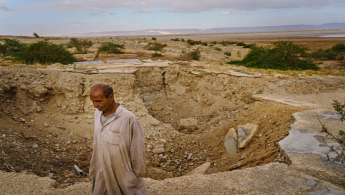Israel, Jordan agree on major water sale, Palestinian trade
Israel and Jordan reached a deal Thursday for Tel Aviv to sell an unprecedented amount of water to the kingdom, while significantly boosting Jordanian exports to Palestinians in the occupied West Bank.
Water resource cooperation has been a core issue between Israel and Jordan since a 1994 peace deal, but relations between the neighbours have frayed in recent years.
At a meeting held just inside the Jordanian border, Israeli Foreign Minister Yair Lapid and his counterpart Ayman Safadi approved Israel's sale of 50 million cubic metres of water to its neighbour.
Statements from both governments confirmed the sale, and said the final details of the transaction would be concluded in the coming days.
Lapid described Jordan as an "important partner" for Israel, and said he was committed to strengthening ties.
Gidon Bromberg, Israeli Director for EcoPeace Middle East -- a leading organisation on regional water cooperation which operates in Israel, the West Bank and Jordan -- described the water sale as "the largest quantity ever sold between the two countries."
It "is a true 'water shed' event," he said.
"It represents an understanding of mutual interests and how countries in the region need to cooperate, if we are to survive the tremendous challenges to water and national security that the climate crisis presents."
Jordan is one of the world's most water-deficient countries and experts say the country, home to 10 million people, has been grappling with one of its most severe droughts in its history.
Israel, which also faces water pressures, is a world leader in desalination.
On the Palestinian trade, both sides confirmed that Jordan's ceiling of potential exports to the West Bank, a territory illegally occupied by Israel since 1967, would increase from about $160 million to $700 million per year.
Jordan's top envoy said in a statement that he and Lapid also discussed a path towards "a just and comprehensive peace" between Israel and the Palestinians.
Bilateral relations grew strained under former Israeli prime minister Benjamin Netanyahu, who was barred from using Jordanian air space earlier this year, thwarting what was supposed to be his first-ever trip to the United Arab Emirates.
Netanyahu was replaced last month by Naftali Bennett, whose coalition has indicated that warming ties with Jordan is a foreign policy priority.





 Follow the Middle East's top stories in English at The New Arab on Google News
Follow the Middle East's top stories in English at The New Arab on Google News


